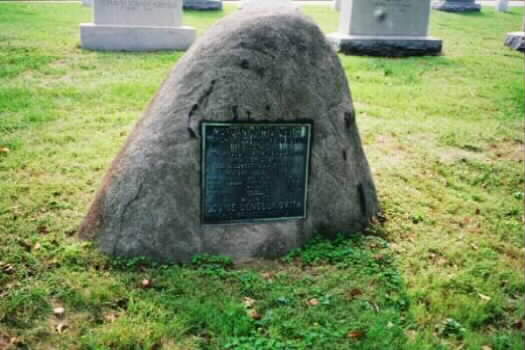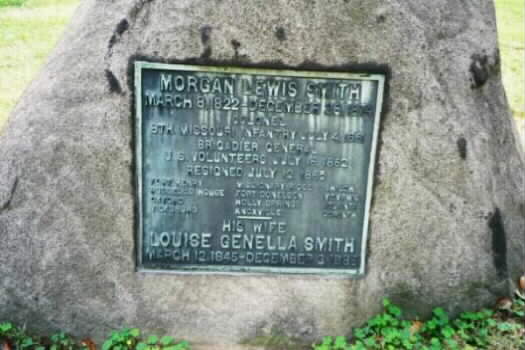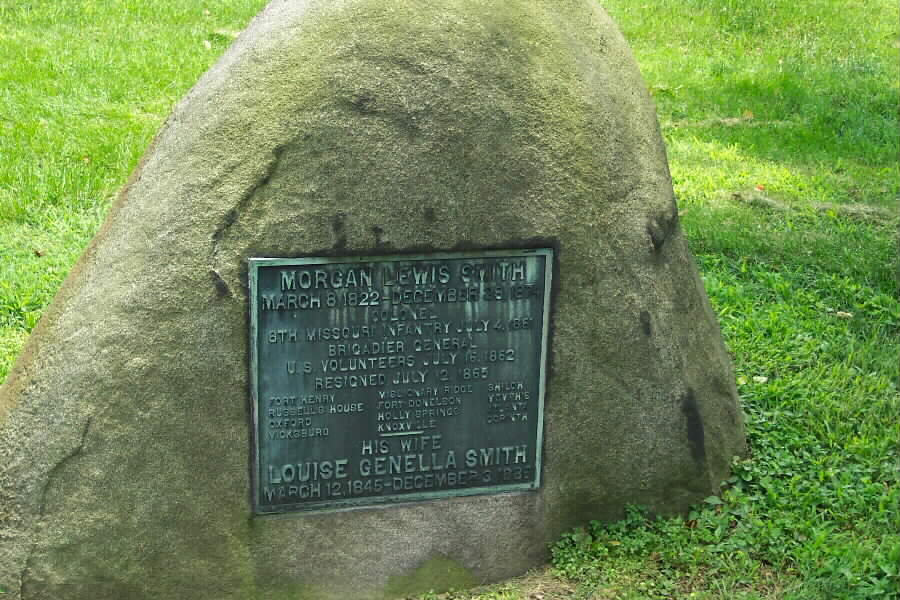Morgan Lewis Smith, the elder brother of General Giles A. Smith, was born in Mexico, New York, and in infancy was taken by his parents to Jefferson County, New York. He left home at age 21 and became something of a wanderer, occupying himself successively as school teacher (New Albany, Indiana), a professional soldier in the Regular Army for five years under an assumed name, and riverboatman on the Ohio and Mississippi Rivers from 1850 until the outbreak of Civil War.
When the war began he recruited and organized the 8th Missouri Volunteer Infantry, which was composed largely of rowdies from the St. Louis waterfront whom he turned into excellent soldiers. He was the regiment’s first Colonel and served as such until he was assigned to Brigade command in the assault on Fort Donelson. His Brigade of Lew Wallace’s Division was heavily engaged at Shiloh; its only casualties were dead and wounded men – a testimonial to his ability on a field where thousands of sulkers went to the rear.
He was advanced to Brigadier General on July 16, 1862, and at the year’s end was so badly wounded that he was unable to return to duty until October 1863. At the battle of Chattanooga in November he commanded the 2nd Division of XV Corps and during the Atlanta Campaign the next year was in temporary command of the Corps while John A. Logan was commanding the Army of the Tennessee after the death of General James McPherson. Soon after, became incapacitated for further active service in the field because of the aggravation of the wound he received at Chickasaw Bluffs.
After returning from sick leave was assigned to the command of the District of Vicksburg, where he remained until the end of the war. Not waiting to be mustered out, he resigned his commission on July 12, 1865, which probably accounts for his failure to receive brevet promotion to Major General.
Andrew Johnson appointed him U.S. Counsel General in Honolulu, Hawaii, where he served until Grant took office. He then engaged in business in Washington, D.C. and acted as counsel for claimants against government, bid on mail routes in South and West, and was connected with a building association.
He died suddenly while on trip to Jersey City, New Jersey, on December 28, 1874 and was buried with full military honors in Section 3, Grave, 1852, of Arlington National Cemetery. His wife, Louise Genella Smith (12 march 1845-3 December 1885) is buried with him.
SMITH, MORGAN L
BRIG-GEN USA
- DATE OF DEATH: 12/28/1874
- BURIED AT: SECTION SEC 3 SITE 1852
ARLINGTON NATIONAL CEMETERY
SMITH, LOUISA G W/O M L
- DATE OF DEATH: 12/05/1885
- BURIED AT: SITE 1852
ARLINGTON NATIONAL CEMETERY - WIFE OF ML SMITH, BRIG GEN, USA
SMITH, Morgan Lewis, soldier, born in Oswego county, New York, 8 March, 1822; died in Jersey City, New Jersey, 29 December, 1874. He settled in New Albany, Indiana, about 1843, and enlisted as a private in the United States army in 1846, rising to the rank of orderly sergeant, gut resigned, and at the beginning of the civil war was engaged in the steamboat business. He then re-entered the service, having raised the 8th Missouri infantry, a regiment whose mere-hers were bound by an oath never to surrender. He was chosen its colonel in July, 1861, took part in the advance of General Ulysses S. Grant’s army to Fort Henry, commanded the 5th brigade of the 3d division of the Army of the Tennessee at Fort Donelson, and successfully stormed a strong position of the enemy. He led the 1st brigade of the same army at Shiloh, was engaged at Corinth and Russell House, accompanied General William T. Sherman to Moscow, Tennessee, and was subsequently in charge of an expedition to Holly Springs, Mississippi, and Memphis, Tennessee He was appointed brigadier general of volunteers in July, 1862′, and made expeditions and reconnaissance’s into Mississippi till November of that year, when he was placed in command of the 2d division of General William T. Sherman’s army, and was severely wounded at Vicksburg, 28 December, 1862′. He assumed his command on his recovery in October, 1863, and was engaged at Missionary Ridge in the movements for the relief of Knoxville and in the Atlanta campaign. He was then placed in charge of Vicksburg, and, by his stern adherence to military law, brought that city into peace and order. He was subsequently United States consul at Honolulu, declined the governorship of Colorado territory, and became a counsel in Washington, D. C., for the collection of claims. At the time of his death he was connected with a building association in Washington, D.C. General William T. Sherman said of him: “He was one of the bravest men in action I ever knew.”
His brother, Giles Alexander, soldier, born in Jefferson county, New York, 29 September, 1829; died in Bloomington, Illinois, 8 November, 1876, engaged in the dry-goods business in Cincinnati, and subsequently in Bloomington, Illinois, and at the beginning of the civil war was the proprietor of a hotel in the last-named town. He became captain in the 8th Missouri volunteers in 1861, was engaged at Fort Henry, Fort Donelson, Shiloh, and Corinth, and became lieutenant colonel and colonel in 1862. He led his regiment at the first attack on Vicksburg, was wounded at Arkansas Post, and in the capture of Vicksburg rescued Admiral David Porter and his iron-clads when they were surrounded and hemmed in by the enemy. In August, 1863, he was promoted brigadier general of volunteers “for gallant and meritorious conduct in the field.” He commanded his brigade in the 15th army corps in the siege of Chattanooga and the battle of Missionary Ridge, in which he was severely wounded. He led a brigade in the 15th corps in the Atlanta campaign, was transferred to the command of the 2d division of the 17th army corps, fought at Atlanta, and, in Sherman’s march to the sea, engaged in all the important movements, especially in the operations in and about Columbia, South Carolina after the surrender of General Robert E. Lee he was transferred to the 25th army corps, became major general of volunteers in 1865, and continued in the service till 1866, when he resigned, declining the commission of colonel of cavalry in the regular army, and settled in Bloomington, Illinois tie was a defeated candidate for congress in 1868, was second assistant postmaster-general in 1869-’72, but resigned on account of failing health. He was a founder of the Society of the Army of Tennessee.
THE LATE GENERAL MORGAN L. SMITH
December 31, 1874
Yesterday morning George Alfred Townsend, ex-Congressman Kavanagh of Nevada, William B. Smith, a brother of the deceased and several other prominent citizens, came to Jersey City to make arrangements for the funeral of General Morgan L. Smith, who was found dead in his bed at Taylor’s Hotel on Tuesday morning. General Smith was well known throughout the country and during the war he gained an enviable reputation for gallantry and military ability.
He was born in Oswego, New York, nearly sixty years ago, and was one of a family of ten, almost all of whom served in the late war. At an early age the subject of this sketch enlisted in the Regular Army and served throughout the Mexican War, at the close of which he had attained the rank of Sergeant. At the beginning of the rebellion of organized the Eighth Missouri Regiment of which he was appointed Colonel. With this regiment Colonel Smith led the attack on Fort Donelson with distinguished gallantry. After the fall of Corinth he was promoted to rank of Brigadier General, and was placed in command of the brigade on picket duty at Memphis. He was wounded at Chickasaw Bluff, near Vicksburg, in an assault in the latter part of 1863, and was about that time promoted to a Major Generalship. After his recovery he was not considered strong enough for active service in the field and was accordingly placed in command at Vicksburg, where he quickly put an end to the Negro outrages which were so prevalent there at that time. Almost the first act of his official career in that city was to cause the summary arrest of thirteen Negroes who had outraged a white family. They were tried by court-martial, convicted and promptly executed.
After the close of the war, General Smith was appointed Counsel to the Sandwich Islands, and while there entertained General McCook and his wife, who were traveling for their health. It was at his residence that Mrs. McCook died. On his return from the Sandwich Islands General Smith was tendered the Governorship of Colorado Territory, but declined the appointment because be disliked holding office. At the time of his death he was engaged in the business of colleting claims, and was in connection with this that he was in Jersey City. The deceased resided in Washington where he leaved a wife and two children. His body will be taken to the capital this morning.
Michael Robert Patterson was born in Arlington and is the son of a former officer of the US Army. So it was no wonder that sooner or later his interests drew him to American history and especially to American military history. Many of his articles can be found on renowned portals like the New York Times, Washingtonpost or Wikipedia.
Reviewed by: Michael Howard



